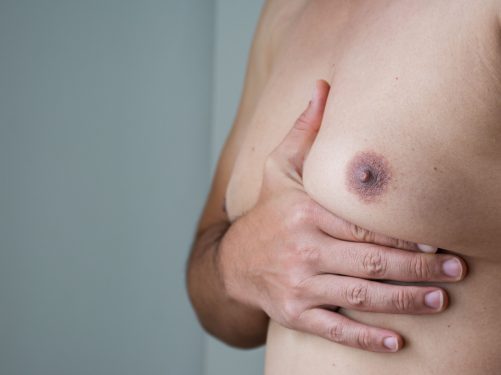Gynecomastia (male breast surgery)
“The definition of true masculinity – and femininity, too – is being able to lay in your own skin comfortably.” Vincent D’Onofrio
Men are increasingly requesting aesthetic surgery designed to make them look fitter, more ‘masculine’ or to maintain a youthful appearance.
Gynaecomastia is a term meaning male breast enlargement. It is quite a common condition requests for treatment are invariably driven by self-consciousness combined with an inability to get rid of unwanted excess breast tissue when all other fitness goals have been achieved. The goal of gynecomastia treatment is to reduce breast size in men who are embarrassed by overly large breasts. Reduction methods include liposuction, cutting out excess glandular tissue or using a combination of liposuction and excision.

Gynecomastia SURGERY – FACTS
| Length of surgery | 2 hours |
| Anaesthesia | General anaesthetic |
| Hospital stay | 1 night |
| Risks/complications of surgery | Frequent: Bruising, swelling, temporary numbness, change in nipple sensation Infrequent: Infection, bleeding (haematoma), delayed wound healing, asymmetry, skin necrosis, permanent numbness, poor scarring, seroma, fat necrosis |
| Recovery | 5-10 days until socialising with close friends and family |
| Driving | 2 weeks |
| Follow up | 1 week, 6 weeks, 3 months, 6 months |
| Duration of results | Permanent unless followed by weight gain |
DOWNLOAD FURTHER INFORMATION
Gynecomastia
Any plastic surgery procedure is a very personal choice and understandably there are a number of questions that arise. This information sheet is a general guide for patients considering gynecomastia (male breast) surgery under the care of Dr Mackenzie. It should provide the answers to some questions that you may have.
Gynecomastia introduction
A male breast reduction is the most effective known treatment for gynecomastia, or enlarged male breasts. This cosmetic surgery procedure removes excess fat and glandular tissue to restore a flatter, firmer and more masculine contour to the chest.
Due to genetics, use of certain medications, or other unspecified reasons, some men develop the appearance of enlarged breasts. Most teenage boys experience some degree of breast enlargement affecting one or both breasts. However, by early adulthood less than 10% have a residual problem. This incidence rises with age, reaching approximately 30% (1 in 3) in older men. There is usually no underlying medical problem, and this should be considered normal for some men. However, before going ahead with any treatment or surgery it is important to see your family doctor, as gynaecomastia can be due to problems with weight, hormone disorders or imbalance, some medications (for high blood pressure, heart disease and prostate cancer), drugs (such as marijuana and anabolic steroids), some diseases (such as liver failure and some cancers) and some very rare congenital abnormalities (errors of development that one is born with).
What is gynecomastia?
Gynaecomastia is a condition that affects men of all ages, right from teens to late 60’s. It is the result of accumulation of fat in the male breast and also of the enlargement of the breast disc.
Who is a good candidate for gynecomastia surgery?
Gynecomastia surgery an individualized procedure and may not be suitable for everyone. The following are common reasons why you may want to consider this procedure:
- Your breast enlargement that cannot be corrected through alternative medical treatments, weight loss and exercise
- You want your chest to have a better, more proportional contour and a firmer look and feel
- You are unhappy with the size or appearance of your breasts
- You experience physical discomfort because of your breasts
- You have good skin elasticity. Successful gynecomastia surgery involves adequate skin contraction after your excess skin is surgically removed. Your skin may lack the necessary elasticity for good contraction if you are age fifty or older, have significant sun damage, have breasts with a lot of stretch marks or have undergone gastric bypass surgery
- You do not use marijuana, steroids or drink alcoholic beverages excessively (it is theorized that these substances may cause gynecomastia)